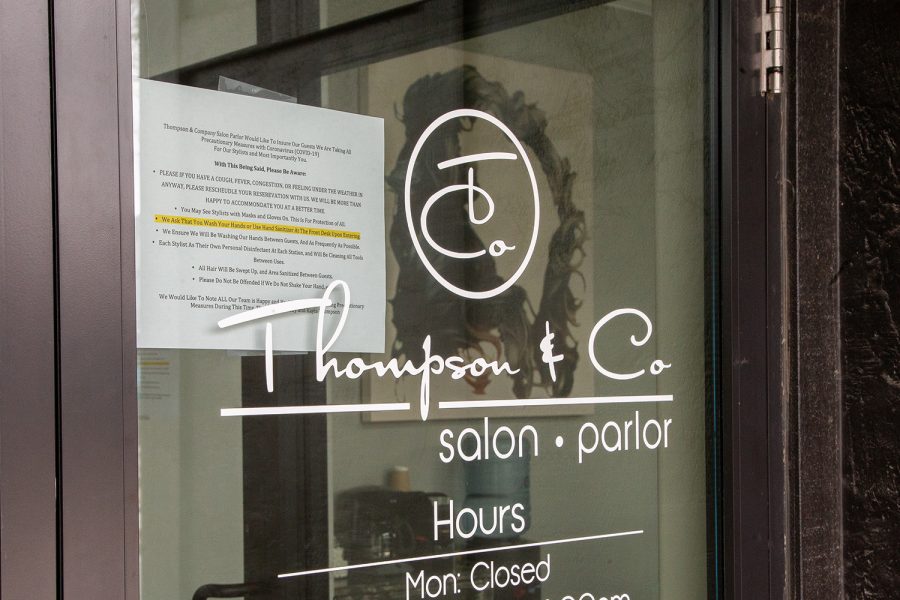Local salons make adjustments as they set to reopen next week
As closure mandates lift, salon owners are readjusting how they plan to safely operate during COVID-19.
Thompson & Co Salon and Parlor is seen on Tuesday, March 24, 2020.
May 7, 2020
Iowa City salons are taking extra precautions to keep themselves, and their customers, safe amid the COVID-19 pandemic as Iowa enters phase two of Iowa Gov. Kim Reynolds’ three-phase COVID-19 response plan, which will open select businesses starting May 15.
Salons are coming up on eight weeks of shutting their doors, after Reynolds announced March 22 that all salons, barber shops, spas, massage therapists, tattoo shops, and swimming pools would close in order to minimize the spread of COVID-19.
Bobby Thompson, the co-director of Thompson & Co., in downtown Iowa City, said that he has spoken with other salon owners across the nation about the best way to move forward safely as a business that works closely with customers. They plan to reopen May 16.
“We’re a person-to-person contact business. Our guests and our stylists are of the utmost importance to us,” he said. “Because we are actually physically touching somebody, I feel that it’s our job to really go above and beyond with the standards of sterilization and things like that.”
Thompson & Co. will be requiring customers to wear masks during their appointments, and customers will be brought in one at a time. The salon will ask people to wait in their cars for their appointment, rather than in their reception area.
Thompson also said that all tools in the salon will be used only once, except for clippers and shears that are already cleaned regularly. Along with frequently sanitizing their hands, stylists at Thompson & Co. will be required to wear personal protective equipment, including face shields.
Kayla Thompson, the co-director of Thompson & Co. and Bobby’s spouse, said the two have been following Reynold’s guidance closely, and preparing to open as safely as they can.
RELATED: Governor closes salons, spas, tattoo shops, and more to combat COVID-19
“We are taking a lot of precautions … ordering face shields and dividers and trying to get our hands on a hand sanitizer just to make sure that our staff is healthy and our guests are healthy, and just doing everything we can to protect ourselves,” she said.
Additionally, the salon plans to screen customers for COVID-19 symptoms, such as fever, with a forehead thermometer.
In the meantime, Bobby said that he hopes the community is staying safe.
“We’re in unprecedented times. We just want to say that we love our guests, love the community that we’re in,” he said. “We’ll get through this together.”
At Groovy Katz Salon in Iowa City, owner Amy Mayfield Lusche is taking similar precautions. The business is receiving guidance through webinars and Zoom meetings from Aveda — its parent company — about the best protocols to practice when it reopens.
“You kind of feel lost in all this,” she said. “It’s nice to have that back up of support from other people.”
Lusche is working on getting face shields for her staff, which she says are difficult to get due to the high demand.
“We have masks that some wonderful people are making for us, and we have all the sanitation guidelines that we have to follow,” she said. “I’ve had some plexiglass shields made for our front desk; it’s a lot of work, but I think I’m feeling pretty confident in what we’ve been getting. It’s just going to be the new normal, for a while.”
In order to reduce the number of people in the salon at a time, only four of the 13 stylists employed at Groovy Katz will be working at one time at a station. In response to the smaller volume of customers at one time, Lusche said the business has extended their normal hours for the first six weeks of being open.
“It’s hard, because we have 10 people who are full-time employees, so that’s been really difficult, but it’s what we have to do,” she said. “Safety comes first.”
As far as returning to normal, Lusche said she doesn’t know what that timeline looks like.
“It’s a question I have to live with, thinking about all the time right now,” Lusche said. “My staff are asking it — they have their lives, they have to work — and it’s really hard right now. I go day-by-day to see how the numbers are. We have to be careful… we just have to be prepared for what it’s come to already.”




